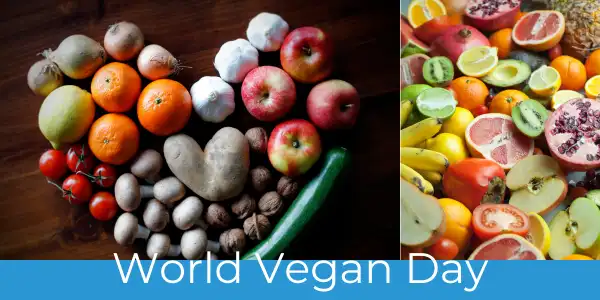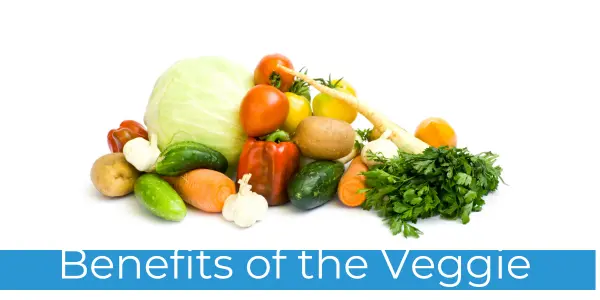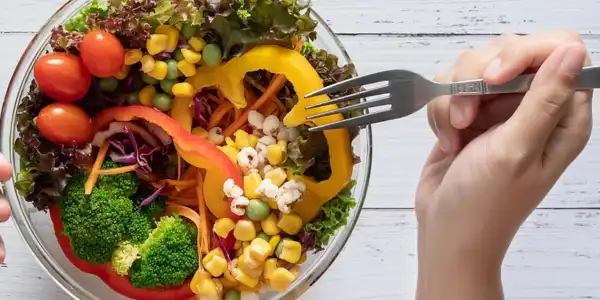World Vegetarian Day – A Comprehensive Guide and Benefits
Updated: 30 Dec 2023
185
World Vegan Day is celebrated every year on 1st November to promote veganism. Its many benefits and life-changing effects on Health. Veganism is a lifestyle to pick and just eat vegetables and completely exclude Meat foods from our diet. It’s not just a day but it is a day of plant-based lifestyle. In this article, we will learn about the History, Benefits, Facts, Pros and Cons, and questions that are asked mostly on Google about Veganism. So Let’s Start!

World Vegan Day History
The first time people celebrated Vegetarian day in 1994. The 50th anniversary of the founding of The Vegan Society in the United Kingdom. Vegetarian Day has grown into a global event every year. People from all over the world celebrate the benefits of a plant-based lifestyle, and its effects on humans, and the environment.
Why is International Vegetarian Day Important?
There are many reasons why Vegan Day is important.
- It is a day to raise awareness about plant-based lifestyle and its benefits.
- It is a day to celebrate the growing vegetarian community and to show support to them.
- It is a day for people to think about their lifestyle and consider the impact they have on animals, humans, and the environment.
Why November 1st?
The 1st November is the International Vegetarian Day to celebrate the founding of The Vegan Society in 1944. This society, co-founded by Donald Watson, aimed to promote a healthy lifestyle and reduce animal killings and bad effects on the environment.
Benefits of the Veggie Diet

Veganism has many benefits, including:
- Reduced animal suffering: Being vegetarians we eat plant-based products and this way we reduce animal suffering.
- Improved human health: A vegan diet reduces the risk of heart disease, stroke, cancer, and type 2 diabetes. It also helps us to live healthily because vegetables and fruits have low calories and a lot of good effects on Human health,
- Reduced environmental impact: Animal agriculture pollutes the environment and contributes to climate change. A vegan lifestyle reduces environmental impact.
How to celebrate Vegan Day?
How to celebrate Vegan Day, Here are a few ideas:
- Eat plant-based products for a day:
If you are not vegetarian, eat vegetables and fruits the whole day to experience the benefits.
- Cook and eat a Vegan meal:
Many delicious and nutritious vegetable recipes are available in online stores. So try a vegetarian meal with your family and enjoy the Day.
- Support vegan businesses and organizations:
Many vegan businesses and organizations are working to promote veganism. Consider supporting these businesses and organizations on not only Vegetarian Day but also on normal days to keep remembering them and their efforts.
- Educate others about veganism:
Talk to your friends and family about veganism and its benefits. You can also share vegan resources online or in person. Share our article with your circle and on social media so people can read and know about the benefits of Vegan Day.
| Table: Facts and figures about veganism | |||||||||||||||
|---|---|---|---|---|---|---|---|---|---|---|---|---|---|---|---|
|
Pros and cons of veganism
In this section, we will discuss some benefits and bad effects of being vegan.
Pros:
- Reduced animal suffering
We kill Billions of animals every year for food. Many farms treat many of these animals heartlessly. But if we eat vegetables then many animals are saved from our hunger.
- Improve human health

A vegetable diet can be very healthy for humans. If we eat Vegetables and fruits daily it’s very beneficial for us and have lower rates of cancer, stroke, heart disease, and type 2 diabetes. They also tend to have lower blood pressure and cholesterol levels. Vegetarian diets are also high in vitamins and fiber, and they are low in fat and cholesterol.
- Reduced environmental impact
Factory farming is a major cause of climate change, water pollution, and deforestation. It accounts for 14.5% of global greenhouse gas emissions and uses 70% of the world’s fresh water. By going vegan, we can all help reduce our environmental impact.
- Weight loss (for some people)
Vegetarian diets are often lower in calories and fat than diets that include animal products. This can help with weight loss for some people.
- Increased energy levels
People who eat vegetables daily often report having more energy. This is probably because veganism is often high in complex carbohydrates and fiber, which provide us with steady energy throughout the day.
- Improved skin health
Vegetables can help us to improve our skin health and provide essential nutrients such as Vitamins A, C, and E. So our skin health and also body health will improve with veggies diet.
- Reduced risk of chronic diseases
A vegan diet can help lower your risk of developing many chronic diseases, including heart disease, stroke, cancer, and type 2 diabetes.
- Easier to digest food
Vegetables are often easier to digest than animal products. This is because they are typically lower in fat and higher in fiber.
- More ethical lifestyle
There are a lot of people who follow a vegan lifestyle for ethical reasons. They think that it is wrong to kill animals for our food and hunger.
Cons of Veganism:
Can be difficult to find vegan food options when eating out
As you know there are many vegetable food options available to restaurants but, it can be difficult to find vegan options when we go for outings. This is especially true when we visit in rural areas or at smaller restaurants. If you are planning to eat out, it is a good idea to do some research before going anywhere.
Can be more expensive to be a vegetarian
There are many foods available at cheap prices but some can be more expensive than others. This is because some foods are not in season. However, there are many ways to save money on a diet, For example, to buy in bulk, choose affordable foods such as lentils, beans, and potatoes.
May need to do more meal planning and preparation
If you are new to a vegan or busy lifestyle it can be more difficult for you to prepare your diet. However, there are many resources available to help you with meal planning and preparation. A lot of online stores and cookbooks are beneficial for preparation and management.
Tips for overcoming the challenges of being vegetarian
- Do your research ahead of time when eating out to find the best options.
- Educate yourself about veganism so that you can confidently answer questions from others.
- Get involved in the vegan community so that you can connect with other vegetarians and find support.
- Buy in bulk and cook more meals at home to save money.
- Choose affordable foods, such as beans, lentils, rice, and potatoes.
- Use resources to help you with meal planning and preparation.
Vegetarian Daily Food Plan
Vegetables can be healthy and delicious. By including a variety of plant-based foods in your diet, you can ensure that you are getting all the nutrients your body needs. Here is a sample vegetarian daily food plan for a few months:
Breakfast:

- Oatmeal with berries and nuts
- Tofu scramble with vegetables
- Whole-wheat toast with avocado and eggs
- Yogurt parfait with fruit and granola
Lunch:
- Salad with grilled tofu or tempeh, vegetables, and dressing
- Lentil soup
- Veggie burger on a whole-wheat bun with sweet potato fries
- Sandwich on whole-wheat bread with hummus, vegetables, and avocado
Dinner:
- Spaghetti with marinara sauce and veggie meatballs
- Vegetable stir-fry with brown rice
- Lentil tacos
- Tofu and vegetable curry
- Chickpea burgers with roasted vegetables
Snacks:
- Fruits and vegetables
- Nuts and seeds
- Hard-boiled eggs
- Yogurt
- Trail mix
Conclusion
So personally, I will recommend you to try at least a week of vegetable meals and count the changes in your body. It’s a good option to be healthy.
Veganism is a lifestyle that has many benefits for animals, humans, and the environment. World Vegan Day is an opportunity to raise awareness about veganism and to challenge people to think about their own lifestyle choices. If you are considering going vegan, there are many resources available to help you get started.
FAQs:
What is veganism?
Veganism is a lifestyle that excludes all forms of animal exploitation and cruelty, for food, clothing, or any other purpose.
What are the benefits of veganism?
There are many benefits to veganism, including reduced animal suffering, improved human health, and reduced environmental impact.
How can I go vegan?
There are many resources available to help you go vegan. You can find vegan recipes online and in cookbooks, and you can also find vegan food options at many restaurants and grocery stores.
What are the best options for daily vegetarian recipes?
There are many best options for daily vegetarian recipes:
- Oatmeal with berries and nuts
- Tofu scramble with vegetables
- Whole-wheat toast with avocado and eggs
- Yogurt parfait with fruit and granola
- Sandwich on whole-wheat bread with hummus, vegetables, and avocado
- Vegetable stir-fry with brown rice
- Lentil tacos
- Tofu and vegetable curry
- etc
What are some traditional vegetarian dishes that can be served for Christmas Day?
Some traditional vegetarian dishes that can be served for Christmas Day dinner include:
- Nut roast
- Mushroom Wellington
- Vegetable lasagna
- Vegetarian shepherd’s pie
- Stuffed squash or peppers
- Roasted root vegetables
- Brussels sprouts with bacon or bacon substitute
- Mashed potatoes
- Gravy
- Cranberry sauce
What are some tips for cooking a vegetarian Christmas Day dinner?
Here are some tips for cooking a vegetarian Christmas Day dinner:
- Plan and make a list of all the dishes you want to prepare. This will help you to stay organized.
- If you are making a nut roast, be sure to soak the nuts overnight before cooking. This will help them to soften and cook evenly.
- When roasting root vegetables, be sure to toss them in oil and salt before roasting. This will help them to brown and crisp up nicely.
- Don’t forget the cranberry sauce! Cranberry sauce is a classic Christmas Day side dish that is also vegetarian.
What are some vegetarian dessert ideas for Christmas Day?
Some dessert ideas for Christmas Day include:
- Christmas pudding
- Fruitcake
- Mince pies
- Gingerbread cookies
- Pecan pie
- Apple pie
- Pumpkin pie
How can I make my vegan Christmas Day dinner more festive?
Here are some tips for making your vegetarian Christmas Day dinner more festive:
- Use festive decorations, such as tablecloths, napkins, and centerpieces.
- Play Christmas music in the background.
- Serve your food on festive dishes.
- Use garnishes, such as fresh herbs, edible flowers, and berries.
- Don’t forget the candles! Candles can add a touch of warmth and elegance to your table.
What is the difference between veganism and vegetarianism?
Veganism is a lifestyle that excludes all forms of animal exploitation and cruelty, for food, clothing, or any other purpose. Vegetarians do not eat meat, poultry, or fish, but they may still eat other animal products, such as eggs and dairy.
Is a vegan diet healthy?
Yes, a well-planned vegan diet can be very healthy. Vegetables are typically high in fiber, vitamins, and minerals, and they are low in saturated fat and cholesterol.
What nutrients do vegans need to be aware of?
Vegans need to be aware of their intake of protein, iron, calcium, and vitamin B12. Protein can be found in a variety of vegan foods, such as beans, lentils, tofu, tempeh, nuts, and seeds. Iron can be found in leafy green vegetables, beans, lentils, and fortified cereals. Calcium can be found in leafy green vegetables, fortified plant milks and yogurts, and tofu. Vitamin B12 is a nutrient that is only found in animal products, so vegans need to take a B12 supplement to ensure adequate intake.
How can I get enough protein on a vegan diet?
There are many ways to get enough protein on a vegan diet. Some good sources of vegan protein include:
- Beans and lentils
- Tofu and tempeh
- Nuts and seeds
- Quinoa
- Whole grains
- Nutritional yeast
How can I get enough iron on a vegan diet?
Some good sources of vegan iron include:
- Leafy green vegetables, such as spinach and kale
- Beans and lentils
- Fortified cereals
- Tofu
- Lentils
- Chickpeas
How can I get enough calcium on a vegan diet?
Some good sources of vegan calcium include:
- Leafy green vegetables, such as spinach and kale
- Fortified plant milks and yogurts
- Tofu
- Tempeh
- Tahini
What are some common challenges of being vegan?
Some common challenges of being vegetarian include:
- Finding vegan food options when eating out
- Dealing with negative comments from others
- Feeling isolated from non-vegans
How can I overcome the challenges of being vegan?
Here are some tips for overcoming the challenges of being vegan:
- Do your research ahead of time when eating out to find vegan options.
- Educate yourself about veganism so that you can confidently answer questions from others.
- Get involved in the vegan community so that you can connect with other vegans and find support.
References
- The Vegan Society: https://www.vegansociety.com/
Please Write Your Comments